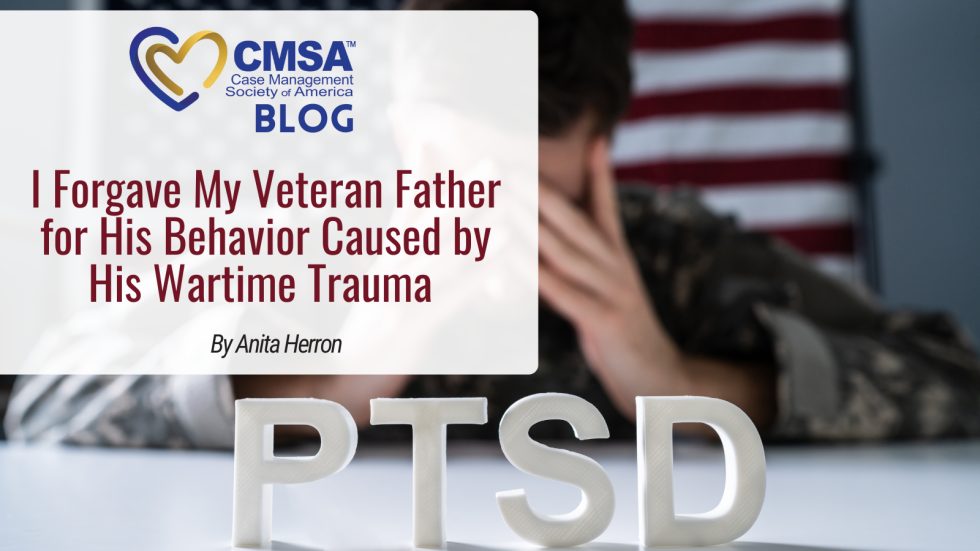I am the senior program manager at the National Alliance on Mental Illness (NAMI). Of the three NAMI education programs I manage, the NAMI Homefront program has allowed me to maintain and strengthen a relationship with my father – a Vietnam veteran whose hidden wounds of war (and how he dealt with that) threatened and minimized my relationship with him for most of my life.
This is a story of a broken relationship that has been mended and strengthened through the things I learned by taking and facilitating NAMI Homefront.
I share this story in the hope that others can understand what happens to Service Members and how they cope or don’t cope with the trauma they experienced in the military during their lifetime. I also share this story to hopefully show this program might help others like me.
As a toddler in the mid-60s, when I saw a man in uniform, I’d ask my mother, “Is that my daddy?” She’s shared over the years how much that embarrassed her because of the strange looks that followed. For me though, I longed for the dad who left for Vietnam when I was an infant and only knew through black and white photographs.
My father returned from Vietnam and continued serving in the Air Force until he retired after 26 years. Growing up with a war veteran dad was a challenge. As a teenager, my father’s anger and words often stung – I can still remember some of the nastiness he spewed at me. For instance, when I was 14 living in the Philippines, I called a male peer to find out what time everyone was meeting at the Teen Center. My father could hear that I was talking to a boy. Once I hung up, he said to me, "You'll always be chasing after boys because nobody will ever want you." Of course, he'd had several beers, but I still remember how this destroyed any bit of self-confidence I had.
In 2008, I saw a brochure with the NAMI North Carolina logo. After walking away a few times and then finally picking it up, I took it home and threw it on my desk. A few weeks later, I reached out to the contact person on the back. I began attending support groups and participated in a class for parents of youth with mental health challenges, NAMI Basics. Shortly thereafter, I began working as a Young Family Program Advocate for NAMI N.C.
My relationship with my father continued to worsen over the years. Working for NAMI and obtaining my degree in Psychology, I began to understand trauma, depression and anger. Still, my relationship with my father led me to some tough choices. It was either continue the relationship with him and live in constant pain or sever the relationship and take care of my own well-being and mental health.
While making this painful decision and trying hard to set boundaries, something I wasn’t very good with at the time, I was hired as the program manager of three education programs at NAMI. One of those programs is NAMI Homefront – a 6-week education program for families, close friends and caregivers of Service Members and Veterans who live with mental health challenges. It was during the first NAMI Homefront class that I realized why my father was so angry – he was living with undiagnosed PTSD – shell shock as he calls it – and had been for many years – without treatment.
In the NAMI Homefront course, we learn about battle mind skills – both on the battlefield and at home and boy are they different at home! I’ll never look at a pile of trash on the side of the road the same again. After taking the class, I understood my father more– his grief, his trauma and his anger. I decided I would build the best possible relationship with him with the time we had left and not turn away. It was the best decision I made.
I share this story as often as I can so that clinicians, family members, case workers and others can understand that family relationships with veterans can be so difficult sometimes, but when we understand the trauma the veteran may have endured, it makes forgiveness and connection possible.
Bio: Anita Herron serves as the Senior Manager of Family Education Programs for NAMI in North Carolina. She began working at NAMI (National Alliance on Mental Illness) in August of 2017 as the Programs Manager for NAMI Family-to-Family, NAMI Basics and NAMI Homefront. Prior to coming to NAMI, Anita served as a Young Families Program Advocate at NAMI North Carolina for seven years. Anita relocated to Gainesville, Florida, after her husband retired from the Army after 28 years of service. She received her bachelor’s degree in Psychology from Troy University.
To learn more about NAMI, go to https://www.nami.org/Home
For a CE course on PTSD, you can find "PTSD: What is It and How to Manage" in our Online Educational Resource Library (free to members) at https://www.pathlms.com/cmsa/courses/36378
For advanced training, including managing complex mental health cases, attend our virtual Integrated Case Management training, April 4-6! Learn more and register at https://www.pathlms.com/cmsa/courses/7005


Thank you Anita for sharing such a personal and poignant story. That sounds like an emotional and difficult road, but for me it is profoundly moving how the NAMI resources and support helped you see things through a different lens. Seems like your story and the resources you provide would definitely be helpful to others who may have had similar experiences. Thank you again for your post!